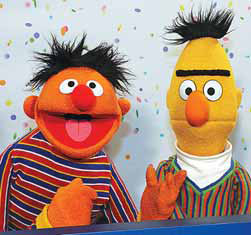Afghan Sesame Street producers create local content
|
Sesame Street characters Ernie (left) and Bert. The show's viewers in Afghanistan include about 1 million 3 to 7 year olds, its target audience, but the actual number of watchers is much greater as whole families are clustered around their TVs. Georg Wendt / AFP |
Indian and Afghan producers of children's TV favorite Sesame Street are brainstorming in a New Delhi office, swapping tips on how to make Big Bird and his fluffy pals palatable to local viewers.
It is a chance for the Afghan producers to tap into their Indian peers' six years of experience in balancing sensitivities in their own culturally and religiously diverse nation.
In doing so, the Afghans are working out how to avoid upsetting their own audiences in their quest to teach reading, writing and arithmetic in a conflict-torn country where only 50 percent of children attend school.
"This is all the education they're getting," said Sayed Farhad Hashimi of the other half. Hashimi is an adviser to Bagch-e-Simsim (Sesame Garden), the Afghan show that launched in 2011 and is now heading into its second season.
Hashimi notes that in his religiously conservative, warring country, the program treads a fine line and is unique as a show for young children there.
"Parents control the television, and they're going to turn it off if they don't like what they see," he said.
"We don't want that to happen. We want it to be received well. In fact, it's vital," he said, adding that the program consults with the government and parents about content.
"In most places, schools aren't open, so we're reaching out to high-need areas."
Sesame Street, which airs in countries from Pakistan to Tanzania to Turkey, insists its co-productions are not done to create positive attitudes toward the United States but to "foster positive attitudes" in children about themselves.
"The goal is to reach all children and at the same time, accommodate local sensibilities," said Ira Joshi, an education director of the Indian version of the highly popular US show, as the Afghans nod strongly in agreement.
Gender equality
On this afternoon, ideas fly thick and fast as the Afghans and the Indians, along with producers from the US parent show, work on a plot showing a seven-year-old girl learning Afghanistan's vigorous Attan national dance.
"We can get her to practice with her little brother," said Mina Sharif, the bubbly Canadian-Afghan producer of the Afghan show, which is funded by the US Department of State and broadcast four afternoons a week.
"We'll get the whole family involved. Everybody will be clapping, even the grandfather," Sharif said.
In the initial season, Afghan script writers feared parents might frown on encouraging children to dance - such activity is often seen as sexual in Afghanistan - so they got them to "exercise" instead.
But these writers figure they've found a way around by getting all the family to participate, while the brother partnering his sister will send a message of "gender equality" in a country where girls rights are often severely curtailed.
"The boy's participation puts the gender part of it across," said Lilith Dollard, content specialist for the US' Sesame Street, which has become a global entertainment powerhouse since its 1969 launch.
"Gender equality is a cross-cutting theme for all we do," said Dollard.
Diversity
Gender equality is also an important buzzword for program makers in India, where girls are often undervalued, resulting in them getting less food, medical attention and schooling than boys.
Promoting acceptance of diversity is another priority, with the Afghans introducing children in different provinces to each other and the Indian program makers doing the same.
"In India, we show a slice of a child's life" in different parts of the country. "We show what these kids have in common," said Joshi.
Both the Afghan and Indian programs promote education with puppets wearing school uniforms to express the importance of education for both boys and girls.
The Indian show features a gutsy girl puppet who says: "Stay in school, study, work hard. There isn't anything you can't do."
In Afghanistan, the program sought to push the envelope a little last season.
Sesame Street viewers in Afghanistan include about 1 million 3 to 7 year olds, its target audience, but the actual number of watchers is much greater as whole families are clustered around their TVs.
"To show the experience of the first day at school, we had a little girl as role model - not a boy as might be the case - taken to the school by her father and mother," said Hashimi.
But the show's tried-and-true formula of songs, letters and numbers presented by vibrantly hued puppets is in abundance in both the shows.
"We don't want to overload the program with messages. We want it to be fun," said Dollard.
(China Daily 03/30/2013 page6)















